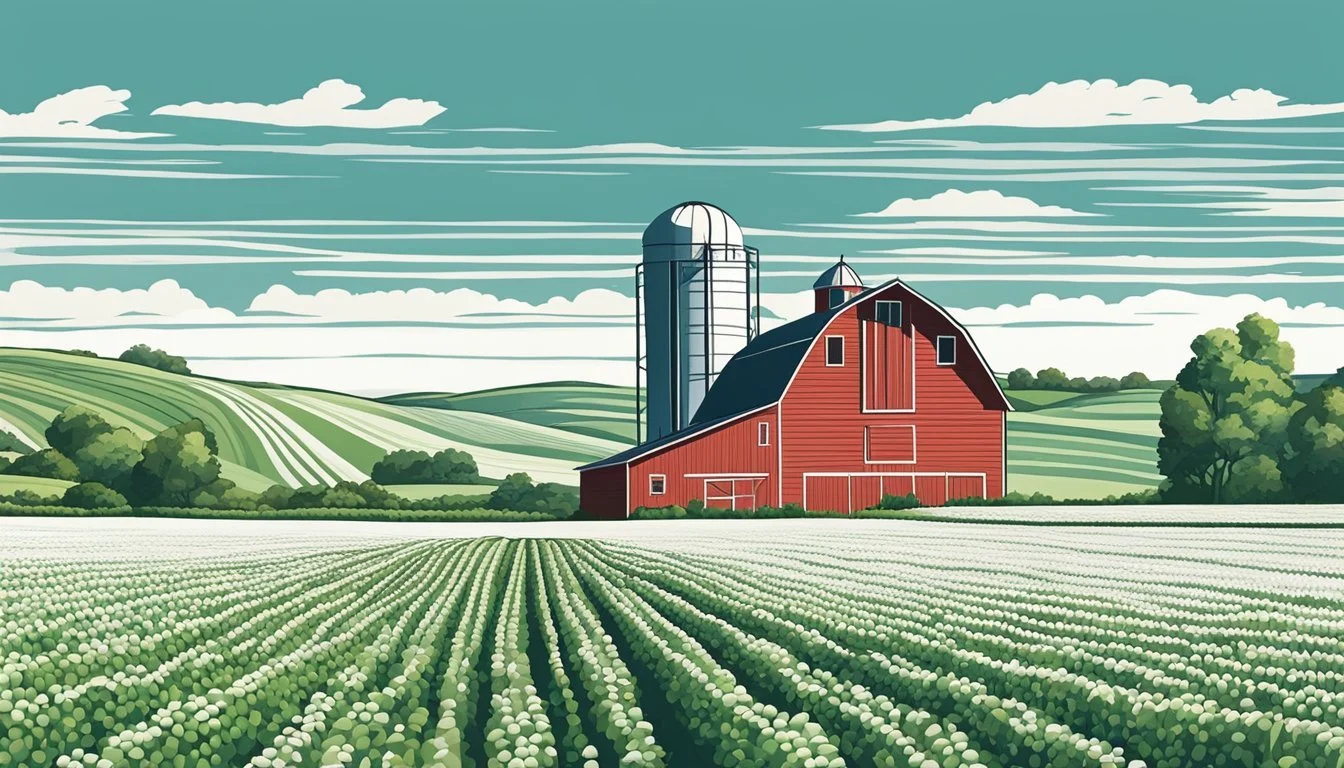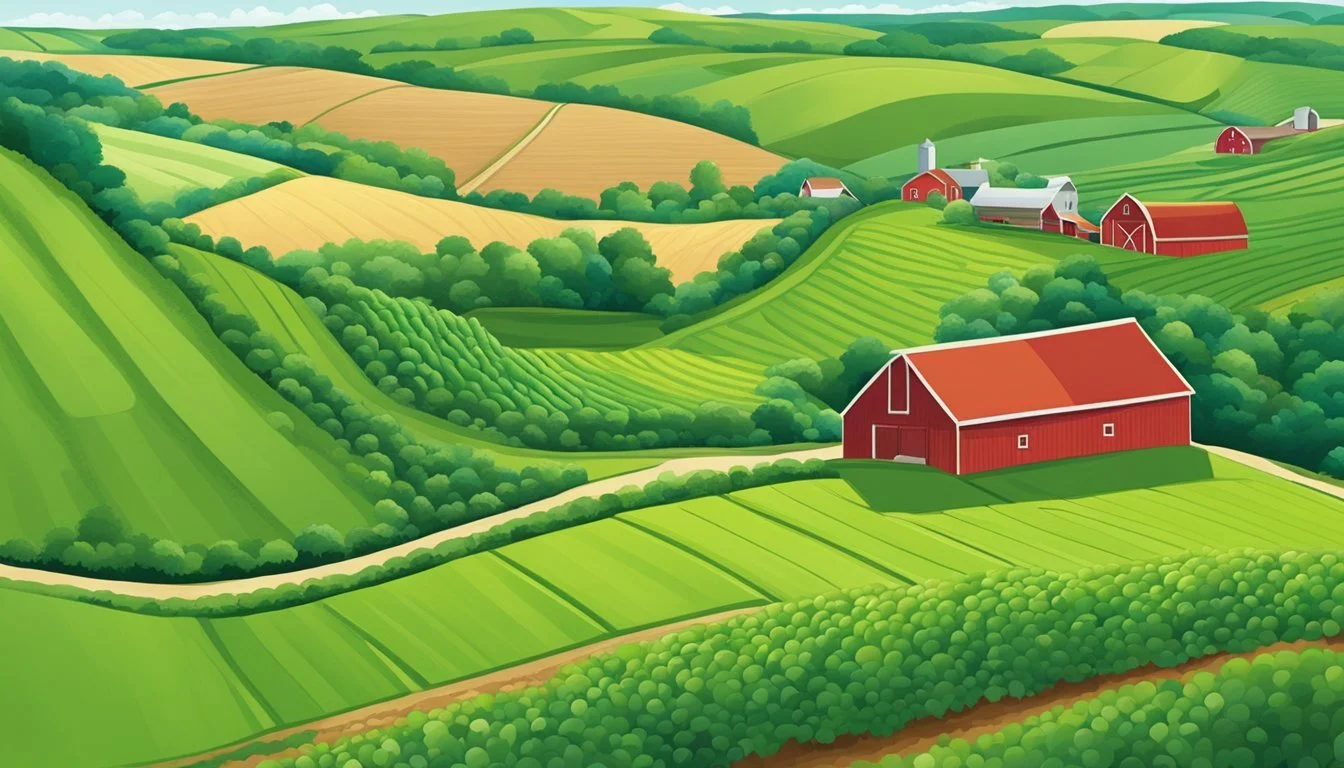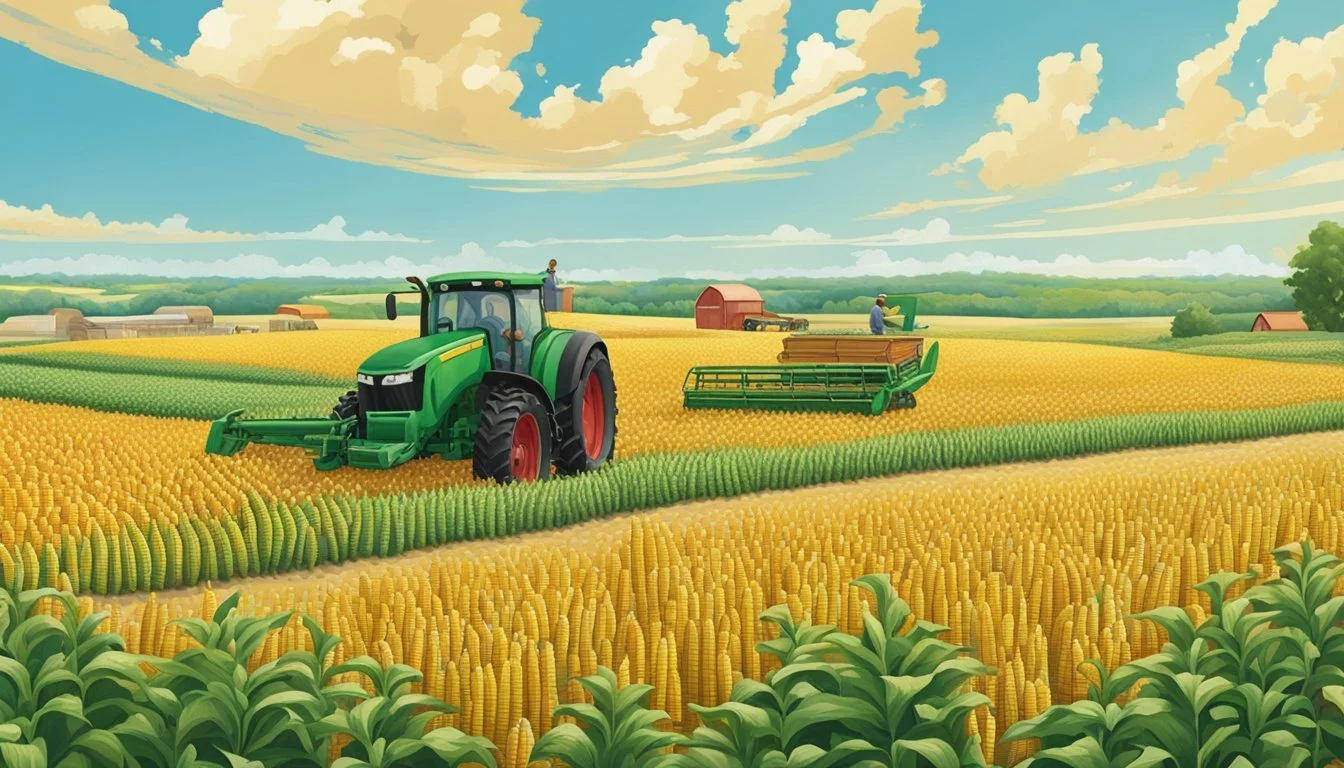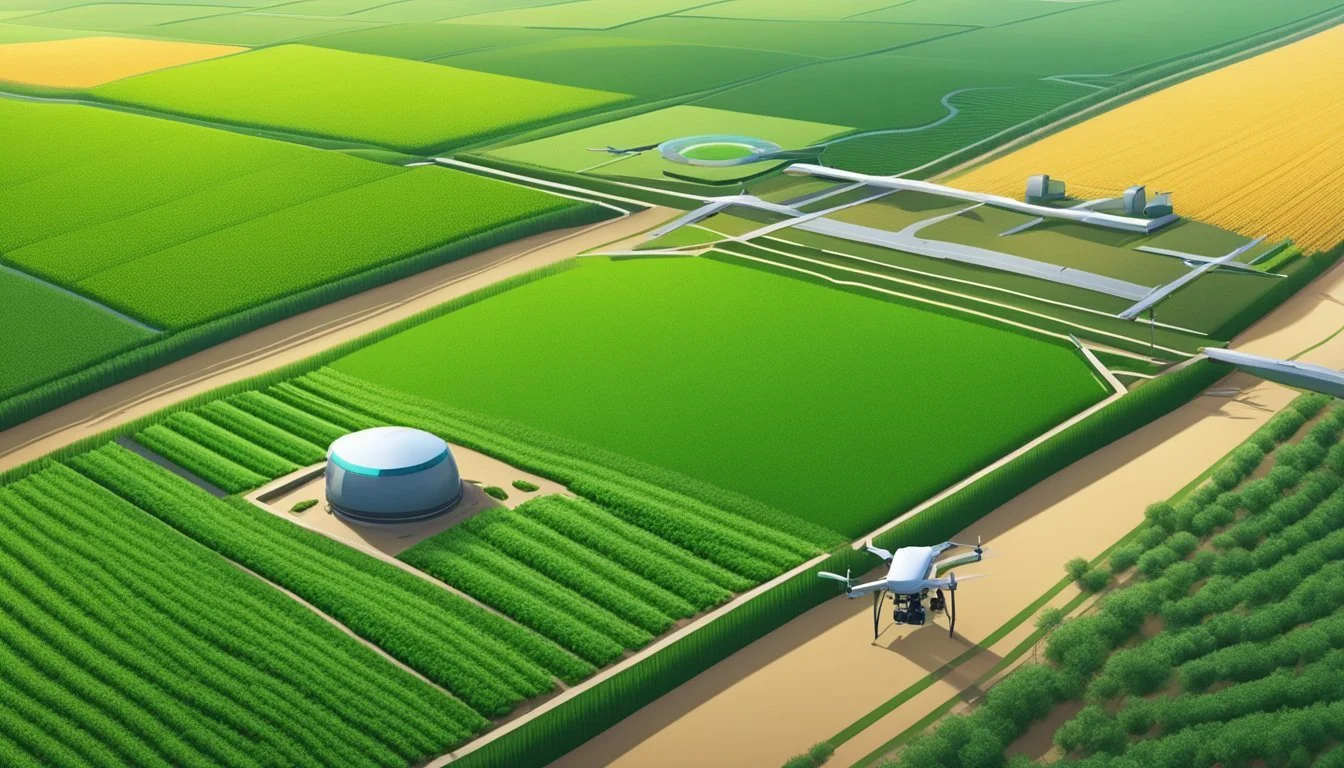Guide to Farming in Iowa
Essential Tips for Successful Agriculture
This Article is Part of Our State by State Farming Guide
Iowa stands as a cornerstone in the American agricultural landscape, consistently ranking among the top states for farming productivity. Its fertile land and favorable growing conditions are suited for a wide variety of crops, making it a leading producer of corn, soybeans, (how long do soybeans last?) pigs, and eggs. The farming sector is a significant contributor to the state's economy, defining much of its cultural identity and societal structure.
In addition to staple crops, Iowa's agricultural industry extends to a diverse range of fruits, vegetables, and livestock. The state's farmers benefit from a rich tradition of agricultural knowledge and a supportive network of resources aimed at both seasoned and beginning farmers. This includes business and financial planning assistance, production guidelines, and technological advancements to ensure sustainable practices and profitability.
With a landscape dominated by farmland, Iowa's agriculture is a testament to the state's commitment to feeding the nation and the world. The state's agricultural success is not only due to its rich soils and ideal growing seasons but also to the resilience and innovation of its farming community. The agriculture sector in Iowa is not just a profession but a way of life that continues to evolve with changing times and technologies.
Understanding Iowa's Agricultural Landscape
Iowa's agricultural landscape is characterized by its rich soil and diverse farming practices, which are influenced by the state's geography and climate. This has led to the prevalence of certain types of farms and focus on key crops and livestock.
Geography and Climate
Iowa's topography is largely defined by its rolling plains which are particularly suited for agriculture. The state's climate is classified as humid continental, marked by hot, humid summers and cold winters. This climate, combined with the fertile soil, particularly from areas like the Des Moines Lobe and the Southern Iowa Drift Plain, becomes conducive for a variety of crops.
Types of Farms in Iowa
Iowa has a mixture of family-owned farms, larger corporate agricultural operations, and specialized farming practices. Major types of farms include:
Grain Farms: Dominated by large-scale operations growing mainly corn and soybeans.
Livestock Farms: Include both concentrated animal feeding operations (CAFOs) and smaller, pasture-based systems for cattle and hogs.
Main Crops and Livestock
Iowa is a top producer of several key agricultural products in the United States:
Crops: Iowa leads in corn and soybeans production, which occupy a majority of the farm acreage.
Corn: Essential for both human consumption and as feed for livestock.
Soybeans: Used for a variety of products, including oil and animal feed.
Livestock:
Cattle: Raised for both beef and dairy production.
Hogs: Iowa is one of the top producers of pork in the country.
Soil and Land Management
Effective soil and land management in Iowa is fundamental for ensuring the long-term sustainability and productivity of its agriculture. Highlighting this objective, the state has developed strategies focused on soil health, innovative crop management, and conservation efforts.
Soil Health Principles
Iowa's agricultural success hinges on understanding and implementing soil health principles. These principles include maintaining soil fertility and balancing chemical components such as pH levels. Iowa's soil is diverse, with variations influenced by factors like glacial drift, loess, and alluvial deposits. Cultivating soil health involves monitoring nutrient levels and adopting practices that encourage biological activity and aeration.
Cover Crops and Crop Rotation
Farmers in Iowa employ cover crops and crop rotation to enhance soil integrity and reduce environmental impact. The choice of cover crops, such as rye or legumes, contributes to soil nourishment by fixing nitrogen levels and reducing erosion.
Benefits of cover crops include:
Erosion control
Improved soil moisture retention
Weed suppression
Disease and pest cycle disruption
Rotating crops like corn and soybeans prevents nutrient depletion and breaks pest and disease cycles, aligning with the Iowa Nutrient Reduction Strategy.
Land Conservation Strategies
Land conservation strategies in Iowa are pivotal, with a focus on land capability and productivity. The state advocates for:
Assessing soil features:
Soil texture (sand, silt, clay percentages)
Drainage and water retention
Evaluating land use:
Suitability for agricultural vs. non-agricultural use
Implementing sustainable practices:
Contour farming
Terracing
Buffer strips
These strategies aim to preserve soil quality and promote responsible land stewardship, ensuring that Iowa's farming landscape remains fertile and productive for future generations.
Water Management and Quality
The health of Iowa's agricultural landscape is deeply intertwined with effective water management and the vigilant upkeep of water quality. Essential agricultural practices hinge on the careful balance and reduction of nitrogen and phosphorus levels, ensuring that water resources sustain both the land and the broader environmental ecosystems.
Water Resources and Usage
Iowa's farms rely heavily on a diverse array of water resources, including surface and groundwater systems. These resources are vital for irrigation, livestock, and processing of agricultural products. Surface water, primarily from rivers and lakes, is supplemented by groundwater from aquifers. Farmers in Iowa are encouraged to utilize water efficiently to preserve these resources for continuous agricultural productivity and environmental sustainability.
Water Quality and the Iowa Nutrient Reduction Strategy
Water quality is paramount in Iowa due to its implications for both human consumption and ecological health. The Iowa Nutrient Reduction Strategy specifically targets the reduction of nitrogen and phosphorus, pollutants chiefly responsible for water quality degradation. Farmers employ various practices to mitigate these issues:
Buffers: Vegetative buffers along waterways are implemented to trap sediments and absorb excess nutrients before they enter water bodies.
In-Field Practices: Strategies such as cover crops and reduced tillage enhance soil health and reduce runoff.
Edge-of-Field Practices: These involve the use of structures like bioreactors and wetlands to filter and break down nutrients before they can affect water sources.
Practice Type Description Benefits Vegetative Buffers Planting of grasses and trees near water bodies Traps sediments, absorbs nutrients Cover Crops Growing of certain crops post-harvest to protect bare soil Improves soil health, reduces nutrient runoff Bioreactors Installation of biomass-filled trenches to treat water runoff Reduces nitrogen levels in water discharge
These strategies collectively aid in meeting the goals set by the Iowa Nutrient Reduction Strategy and support the vision for a cleaner and more sustainable agricultural environment within the state.
Sustainable Farming Practices
Iowa's dedication to sustainable farming practices is evident through its adoption of innovative agricultural techniques. These practices aim to enhance ecosystem health, improve soil quality, and ensure the long-term viability of farming.
Crop Diversity and Rotation
Crop diversity and rotation are key components in sustainable agriculture in Iowa. By alternating crops across seasons, farmers can interrupt the cycle of pests and diseases, decrease the dependency on chemical fertilizers, and improve soil structure and health. Typical rotations include a mix of cash crops such as corn and soybeans with cover crops like rye or clover, which fix nitrogen and enhance soil organic matter.
Sustainability: Crop rotation supports a balanced ecosystem and long-term soil fertility.
Renewable Energy: Diverse crops can provide raw materials for bioenergy, contributing to renewable energy goals.
Sustainable Livestock Grazing
Sustainable livestock grazing involves management practices that maintain the health of the grazing land. In Iowa, holistic grazing techniques are implemented, such as:
Grazing: Rotational grazing, where livestock are moved between pastures, promotes even manure distribution and reduces overgrazing.
Sustainability: This grazing approach sustains plant growth and supports soil restoration efforts.
Farmers focus on the long-term effects of grazing on pasture health to ensure both livestock and land can thrive together.
Organic Farming
Organic farming is a growing practice in Iowa, emphasizing the use of organic fertilizers and pest control methods. It forbids the use of synthetic pesticides and genetically modified organisms, hence ensuring the production of chemical-free and non-GMO crops. Here are the focal points:
Sustainability: Reduces the environmental footprint by minimizing soil and water contamination.
Sustainable Agriculture: Embraces natural processes and cycles, aiming for harmony with the environment.
Organic farming in Iowa also adheres to strict certification standards to guarantee the integrity of its organic products.
Financial Planning and Support
Effective financial planning and support are crucial for the success of farming operations in Iowa. Farmers must engage in meticulous business planning, understand the available financial assistance, and explore savings programs tailored to agricultural businesses.
Developing a Farm Business Plan
A robust farm business plan is the cornerstone of a successful agricultural operation. It allows farmers to project future income, expenses, and profitability. Iowa State University Extension and Outreach offers resources, such as farm financial counseling and a computerized farm business analysis. These services guide farmers through the intricacies of economic planning and help identify areas of improvement within their operations.
State and Federal Financial Assistance
Farmers in Iowa have access to a variety of financial assistance programs. Loans and grants from the Farm Service Agency (FSA) provide federal backing, helping new and existing farmers finance their businesses. Furthermore, the Center for Rural Affairs and National Young Farmers Coalition offer guides and resources to navigate the intricate landscape of farm loans and understand the financial aid available.
Practical Farmers of Iowa Savings Program
The Savings Incentive Program run by the Practical Farmers of Iowa is designed to assist new farmers in building their assets. Eligible farmers can receive matching funds up to $2400 to put towards the purchase of assets such as land, equipment, or breeding livestock, fostering community support and encouraging the growth of their business. This program complements the financial planning and business education farmers receive, strengthening Iowa's agricultural community.
Marketing and Sales
Effective marketing and sales strategies are crucial for Iowa farmers looking to capitalize on the state's agricultural strength. They must explore diverse channels to increase the visibility and profitability of their products.
Navigating Local Markets
Farmers in Iowa have the opportunity to enhance their presence within local communities through farmers markets, which serve as a nexus for networking and customer engagement. At these local markets, farmers can showcase the quality of their produce directly to consumers, building a loyal community base and fostering relationship marketing. To maximize opportunities for sales, farmers should research peak times, popular products, and the customer base of various markets.
Utilizing Online and Direct Sales
In today's digital age, Iowa farmers can expand their reach through online platforms, creating a direct-to-consumer sales channel. This approach broadens their network and opens new marketing avenues. They can utilize social media, create an engaging website, or join online marketplaces targeting the agricultural sector. Online sales are not just about transactions; they also act as a community-building tool, where farmers can share stories and connect with customers on a more personal level.
Advanced Agricultural Technology
Iowa's agricultural landscape harnesses cutting-edge technologies to maximize productivity and innovation. These advancements not only contribute to the state's robust agrarian output but also position Iowa at the forefront of precision agriculture and automation in farming.
Precision Agriculture
Precision agriculture in Iowa integrates various forms of technology to maximize field-level management with respect to crop farming. Key components of precision agriculture include:
GPS Technology: Enables precise field mapping and soil sampling, allowing farmers to work with incredible accuracy.
Data Management Systems: Collect and analyze real-time data on crop health, soil conditions, and weather patterns to inform decision-making.
Variable Rate Technology (VRT): Applies fertilizers, pesticides, and seeds at variable rates across a single field to optimize inputs and enhance crop yields.
By leveraging these tools, Iowa farmers are able to ensure that every inch of their land is utilized effectively and sustainably.
Automation in Farming
Automation has revolutionized farming practices in Iowa, leading to significant improvements in efficiency and productivity:
Robotic Systems: Automate repetitive tasks like weeding, harvesting, and milking, reducing labor costs and increasing precision.
Autonomous Tractors and Harvesters: Equipped with GPS and sensors, these machines can operate with minimal human intervention, reducing operational time and costs.
Drone Technology: Offers aerial surveillance to monitor crop health and growth, providing data that can be used to improve farming practices.
These technological innovations enable Iowa farmers to manage their resources more efficiently, thereby increasing the overall productivity of their operations.
Community and Educational Resources
Educational support and community initiatives significantly enhance Iowa's farming landscape by fostering knowledge exchange and promoting sustainable practices. These resources serve as vital support systems for Iowa farmers and contribute to the state's agricultural prowess.
Iowa State University Extension and Outreach
Iowa State University Extension and Outreach plays a pivotal role in empowering the farming community with research-based knowledge. It offers a multitude of programs and services aimed at improving agricultural productivity and sustainability. Key offerings include:
Problem-Solving Services: Addressing specific agricultural challenges
Educational Programs: Workshops and courses in crop management, livestock rearing, and business development
Practical Farmers of Iowa Network
Practical Farmers of Iowa (PFI) is a collaborative network that facilitates peer-to-peer learning and provides access to a wealth of farming resources. This network offers:
Learning Opportunities: Field days, webinars, and conferences that allow farmers to share experiences and best practices
Support for Beginning Farmers: Dedicated resources for new entrants focused on business and production strategies
These resources not only bolster individual farmers but also strengthen the community as a whole, reinforcing the importance of agriculture in Iowa.
Preparing for the Future
In Iowa, farming strategies continually evolve to ensure resilience in the face of a changing climate and to provide opportunities for beginning farmers. Clear planning is essential for the state's agricultural future to reinforce its position as a leading force in the nation's farming industry.
Climate Change and Agriculture
Climate resilience is becoming a focal point for agriculture in Iowa. Iowa State University studies call for adaptive measures that farmers can implement to combat the changing climate. These include:
Diversified cropping systems: Introducing a wider range of crops to spread risk.
Conservation tillage practices: Reducing soil erosion and improving water retention.
Cover cropping: Using off-season crops to protect and enrich the soil.
These practices aim to maintain Iowa's robust agricultural output while addressing the environmental challenges on the horizon.
Opportunities for Beginning Farmers
Iowa provides a supportive environment for beginning farmers, who are crucial for sustaining rural communities and the state's agricultural legacy. The state fosters opportunity through initiatives such as:
Workshops and conferences: Offering guidance on farm succession planning and business development.
Educational programs: Equipping new farmers with knowledge in ag systems technology and sustainable practices.
Land access: Facilitating the acquisition of farmland for new entrants to the sector through innovative funding and leasing options.
These resources aim to empower the next generation of farmers with the tools they need to thrive in Iowa's competitive farming landscape.







